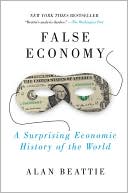
By Scott Ronalds
I recently finished reading False Economy – A Surprising Economic History of the World. Along with its New York Times Bestseller status and praise from all the usual suspects (The Washington Post, Financial Times, The Economist, etc.), I was intrigued by the book’s accolades from Bono and Mohamed El-Erian (CEO of PIMCO, the largest bond fund manager in the U.S.). If it appealed to a rock star and a bond geek, I figured it must be worth a read.
The book is written by Alan Beattie, the world trade editor for the Financial Times. Beattie examines the different paths that various nations have travelled in their rise to economic success or failure.
False Economy leads off with a comparison of Argentina and the United States. Beattie points out that just a short century ago, both nations were in similar places. Yet, the paths they took were very different. He explains how Argentina backed a small number of wealthy and powerful landowning families while America favoured small homesteads and settlers. American business owners invested in industrializing their country and created a nimble industrial sector, while Argentina developed a fear of the free market and sealed off its manufacturing companies behind a high wall of tariff protection. The American political system absorbed new ideas while Argentine politics were dominated by a small, self-perpetuating elite, which eventually led to a military coup and a nationalist (if not fascist) form of government. And the rest is history.
Beattie then jumps to the middle east to examine the strategic use of water and questions why Egypt doesn’t import more of its staple food. Subsequent topics include oil and diamonds (he suggests they are more trouble than they are worth), the role of religion in economic fate, and corruption (which he opines may be less damaging than it first appears).
Each of the book’s 10 chapters examines a particular nation or region and its economic history, with the author’s take on why the nation succeeded or failed and what lessons were learned along the way. His wish is that “the experience of history should lead us to hope and strive to make the world better, not to despair and resign ourselves to fate.”
While the book can be dense at times, Beattie keeps readers engaged by exploring seemingly random yet provocative topics, such as why Africa doesn’t grow cocaine, why much of America’s asparagus comes from Peru, and why giant pandas are “incompetent, inefficient piebald buffoons, and we should end their public subsidies and let them die out”.
All said, False Economy is an interesting book with good insights and lots of useful information. Yet, it reads like a text book in parts, which is why, like me, you may want to have your iPod on hand if you need a break. I found U2 to be rather appropriate.

